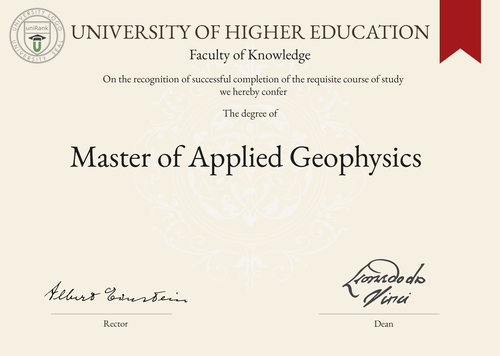
Master of Applied Geophysics (MAG)
Guide to University Programs/Courses
Master of Applied Geophysics (MAG)

Program/Course Name
Master of Applied GeophysicsProgram/Course Abbreviation
MAGDuration Range
The duration of the Master of Applied Geophysics program typically ranges from 1 to 2 years.Tuition range
The tuition fees for the Master of Applied Geophysics program can vary depending on the chosen country or university. It is recommended to check with specific institutions for accurate information.Overview
The Master of Applied Geophysics program is designed to provide students with advanced knowledge and skills in the field of geophysics. It focuses on the practical application of geophysical methods for various purposes, such as mineral exploration, environmental assessment and natural hazard analysis.Curriculum Overview by Year
The curriculum of the Master of Applied Geophysics program is structured to cover both theoretical and practical aspects of geophysics. The coursework typically includes subjects like seismic exploration, gravity and magnetic methods, electrical and electromagnetic methods and data analysis techniques. Students also have the opportunity to engage in fieldwork and research projects.Key Components
The key components of the Master of Applied Geophysics program include in-depth knowledge of geophysical methods, hands-on experience with geophysical instruments and software, data interpretation and analysis skills and the ability to apply geophysical techniques to real-world problems.Career Prospects
Graduates of the Master of Applied Geophysics program can pursue various career paths in industries such as mining, oil and gas, environmental consulting and geotechnical engineering. They can work as geophysicists, exploration geologists, environmental consultants, or research scientists in both public and private sectors.Salary Expectations
The salary expectations for individuals with a Master of Applied Geophysics degree can vary depending on factors such as job location, industry and level of experience. Generally, geophysicists earn competitive salaries, with the potential for higher earnings as they gain more experience and expertise. For a more accurate understanding of salary expectations, you can utilize the Job Sites Search Engine, from our sister site jobRank, which searches over 4,600 job sites worldwide. Make sure to specify not only the job title but also the country you are interested in.Conclusions
It is important to note that the duration, tuition fees, curriculum, key components, career prospects and salary expectations of the Master of Applied Geophysics program can vary depending on the chosen country or location of study, as well as the specific university offering the program. Prospective students are advised to research and compare different institutions to find the best fit for their academic and career goals.Furthermore, visitors interested in pursuing a Master of Applied Geophysics degree anywhere in the world can utilize the uniRank World Universities Search Engine. This search engine allows individuals to explore universities worldwide that offer this specific degree, providing a comprehensive resource for finding suitable educational institutions.World Universities Search Engine
search for Master of Applied Geophysics (MAG) and add the Location (country, state etc.) or specific University you are interested in studying at.
Query examples:
- Master of Applied Geophysics (MAG) United States
- Master of Applied Geophysics (MAG) United Kingdom online
- Master of Applied Geophysics (MAG) Australia international students
- Master of Applied Geophysics (MAG) University of California
- Master of Applied Geophysics (MAG) University of London tuition fees
- Master of Applied Geophysics (MAG) University of Sydney scholarships